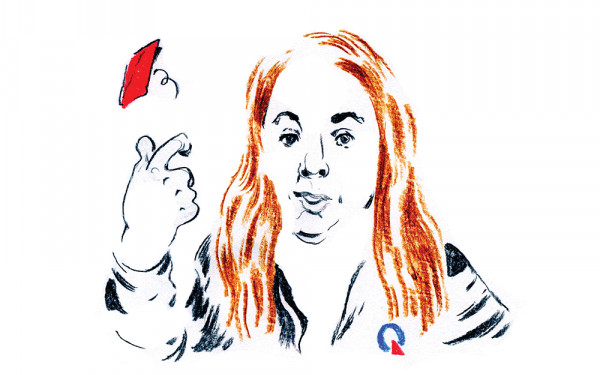Anatomy of a Grassroots Campaign
Concordia Student Runs Against PQ Minister Responsible for the Charter of Values
Provincial politics in Quebec is seemingly seeing a resurgence of interest among youth. As was the case in 2012, a year characterized by months of student protests, quite a few young Quebecers threw their hats into the ring in Monday’s provincial election.
Among the most well-known was Léo Bureau-Blouin, the leader of the Fédération étudiante collégiale du Québec during the 2012 student strikes, who was seeking re-election with the Parti Québécois in the Laval-des-Rapides riding.
Also running for the PQ in this year’s election was Martine Desjardins, the 32-year-old former president of the Fédération étudiante universitaire du Québec, who was a candidate in the North Shore riding of Groulx.
Both lost their respective races.
Smaller political parties also benefitted from the heightened political engagement of young Quebecers. Catherine Lovatt-Smith—a 24-year-old political science and public policy student at Concordia—chose to run with the Green Party in her South Shore riding of Marie-Victorin. It’s the riding that, prior to the election, was held by the PQ minister responsible for the controversial Charter of Quebec Values, Bernard Drainville.
He was re-elected on Monday.
Lovatt-Smith, the VP External of the Political Science Student Association, said she chose to get involved with the Green Party, instead of one of the larger political formations, as a matter of principle—she supports the Greens’ electoral platform, which argues in favour of free public transit and free education, and against the Charter of Values proposed by the PQ.
To get a sense of what running with one of Quebec’s smaller political parties entails, The Link followed Lovatt-Smith on the campaign trail, from the nomination process through Election Day.
March 13
3_900_600_90.jpg)
Before having their names added to the ballot, candidates in provincial elections have to collect 100 signatures on their nomination papers from people living in the constituency they are running in.
For high-profile candidates with the larger parties, that often means sending out volunteers to knock on doors. But for Lovatt-Smith, that meant a trip to the street she grew up on. Her family has since moved, but she figured many of the street’s residents would still recognize her.
With the snow still glistening, Lovatt-Smith and a friend, Sophie Hallé, walked door to door. Some residents turned Lovatt-Smith down, while others needed a little convincing. She reminded them that signing a candidate’s nomination papers isn’t a pledge to vote for the candidate on election day.
Others didn’t need to be persuaded. Emilio Casella, a one-time neighbour, had words of encouragement for Lovatt-Smith and said the Green Party is the right fit for her.
“I knew her from when she was very young and even then, when she was young, she was already someone who was very green-minded,” he said.
Some question whether younger candidates have enough life experience to be effective legislators, but Casella said it doesn’t bother him that young people like Lovatt-Smith are choosing to enter provincial politics.
“It’s true that experience helps,” he said. “I’m not saying that experience doesn’t help, but at some point, you have to start somewhere in life, and if you don’t start somewhere, your dream will never be achieved. If you have a dream, you have to start young.”
March 26
4_900_612_90.jpg)
Lovatt-Smith was invited to Collège Édouard-Montpetit to participate in a political debate organized by the CEGEP’s student association. There were representatives present for the Coalition Avenir Québec, Option nationale and Québec solidaire, but the PQ and Liberal Party didn’t send any candidates to the debate.
The first segment of the debate revolved around the topic of national identity. Lovatt-Smith elaborated on the Green Party’s position on the charter.
“We are against the banning of religious symbols, that the government would try to prohibit us from wearing what we want, from believing what we want when we represent the government,” she said.
“The government is the largest employer in Quebec. It employs close to 1 million or more in public administration,” she continued. “It has to respect the right to work. When we go to a potential employer and we have an interview, we’re not supposed to be judged based on our region or our appearance, yet that’s exactly what the government would impose.”
The moderator asked the four candidates to explain their parties’ energy policies and positions on environmental issues.
“I’m glad that someone brought up the electrification of transport before me,” Lovatt-Smith said. “The electrification of transport isn’t necessarily environmentally-friendly, it’s not necessarily the best solution. A car, in order to be electric, needs a battery, and the batteries require that we mine for rare earth metals.”
She said there is already a mining project extracting rare earth metals in the Témiscamingue region that is polluting potable water.
“Citizens are concerned,” she said. “For each individual car to have a battery, it could create even more pollution and affect the water supply.”
April 3
5_900_631_90.jpg)
7_900_678_90.jpg)
Several candidates for the Green Party of Quebec—Lovatt-Smith included—participated in a protest on April 3 denouncing budget cuts to various government programs. The student federation that organized the protest, the Association pour une solidarité syndicale étudiante, estimated the crowd to be 15,000-strong.
Lovatt-Smith said the protesters’ demands for a “more egalitarian” budget and fewer austerity measures are compatible with the electoral promises of the Green Party.
“Our platform mentions that we want companies, banks and big business to pay more taxes,” she said, adding that Quebec could generate $3 billion in new revenue by taxing corporations more.
“That money can be invested in free [public] transportation that we want to offer to the population and also free education, because it costs approximately $700 million to send all university students to school for one year. It would be easy for us to tax the rich and, in that way, have the money to offer [services] to the population.”
April 6
8_900_793_90.jpg)
Inside the Longueuil bus terminal, Lovatt-Smith greeted commuters arriving from Montreal, smiling broadly like only a politician can. She obtained a permit allowing her to hand out flyers inside the building.
With the Montreal metro’s yellow line closed on the weekends for repairs until the end of May, commuters were instead ferried between Montreal and the South Shore aboard shuttle buses.
Glancing at the flyers, some commuters expressed disbelief when they saw that the Green Party is in favour of zero-fare public transportation. Only a small number of cities around the world offer public transit free-of-charge to their residents, and most of those cities have populations considerably smaller than Montreal’s.
An older man with three PQ campaign buttons pinned onto his jacket approached Lovatt-Smith. Taking a look at a flyer, he asked her why the Green Party is opposed to the charter.
“The Green Party has always been a party that supports human rights, since [it was relaunched] in 2001,” she said.
“And the charter is against human rights?” he asked.
“Yes, totally, at least in our opinion, based on our research,” she replied.
“And the women that are threatened by the terrorists, the integrationists—let’s be clear, not just Muslims—they don’t have rights?” he continued.
The conversation turned to sovereignty. Lovatt-Smith explained that the Green Party is neither in favour nor against Quebec independence, having no official policy on the subject. Instead, Green MNAs would be able to vote their conscience in the event that the National Assembly would have to vote on whether or not to hold another referendum on sovereignty.
The man left, seemingly dissatisfied with her answer.
Voting Day
9_900_726_90.jpg)
As she cast her ballot on Monday afternoon at a community centre in her riding, Lovatt-Smith said she was feeling anxious about how the vote would turn out and whether or not Drainville would be re-elected in the riding.
Drainville was indeed elected in Marie-Victorin, with 38.2 per cent of the vote compared to Liberal candidate Jean-Guy Tremblay’s 26 per cent. Lovatt-Smith came in fifth, behind the major parties, with 2.32 per cent, or 707 votes.
Lovatt-Smith said her only regret was “not being available enough” because she was sick for part of the campaign and also had to juggle a job, extra-curricular involvement at Concordia and her candidacy.
Running as a candidate in the election was a learning experience, and Lovatt-Smith said she was still trying to grasp exactly how to mobilize voters.
“I’ve learned that it’s really hard to mobilize people,” she said. “It can be students or just adults in general. But that’s why politicians are there, right? They’re there to do the [legislative] work that the rest of the population doesn’t want to do.”
When asked why voters should consider voting for smaller parties that aren’t likely to win a seat, she said, “Every party starts from somewhere.”
“When you vote, you have to vote for the person that you feel really represents you,” she continued. “If everybody would do that, we wouldn’t have the two-party system.”
Lovatt-Smith said she plans to stay involved in the Green Party after the election.
“I’m thinking about opening a club at Concordia, a Green Party of Quebec club,” she said, adding it’s her last semester at the university, however. “That could be my legacy at school.”

1-page3_900_570_90.jpg)


_600_375_90_s_c1.jpg)
_600_375_90_s_c1.jpg)

